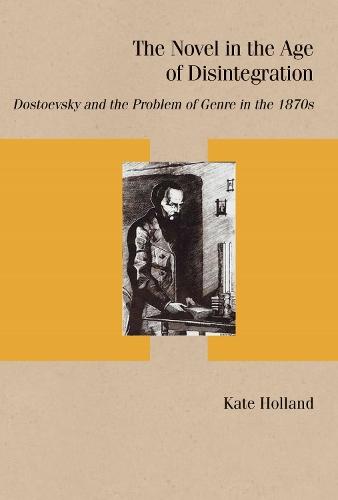Full Product Details
Author: Kate Holland
Publisher: Northwestern University Press
Imprint: Northwestern University Press
Dimensions:
Width: 15.20cm
, Height: 1.70cm
, Length: 22.60cm
Weight: 0.353kg
ISBN: 9780810144491
ISBN 10: 0810144492
Pages: 264
Publication Date: 30 October 2021
Audience:
General/trade
,
General
Format: Paperback
Publisher's Status: Active
Availability: Available To Order

We have confirmation that this item is in stock with the supplier. It will be ordered in for you and dispatched immediately.
Reviews
Holland's book is a must for Dostoevsky scholars as well as for those with a general interest in Russian life and letters at the end of the nineteenth century. --Forum for Modern Language Studies This book is distinguished from other studies of Dostoevskii in two ways: first, it offers an in-depth analysis of two rarely examined texts: The Adolescent and A Writer's Diary. Second, the book examines Dostoevskii's poetics of the 1870s with detailed references to historical, literary and religious documents, arguing that his work is a conscious response to social disintegrations and an expression of his wish for unities... To argue that Dostoevskii's world is pluralistic is far from a novel point of view. Holland manages to reiterate this point by looking at the subtle shifts of genres within the Diary and individual novels, which are experimental and yet reasonable responses in face of the age of disintegration. --Slavic and East European Review Holland's treatment of tightly interconnected discourse types in Dostoevskii's literary utopias conforms to Northrop Frye's typology of genres. But rather than discussing macrostructures and their archetypal genesis, she undertakes a detailed analysis of semantic and even grammatical microstructures that characterized both Dostoevskii's own writings and the cultural jargon of the two decades that followed the publication of the Tsar's Emancipation Manifesto in 1861. --Slavic Review
This book is distinguished from other studies of Dostoevskii in two ways: first, it offers an in-depth analysis of two rarely examined texts: The Adolescent and A Writer's Diary. Second, the book examines Dostoevskii's poetics of the 1870s with detailed references to historical, literary and religious documents, arguing that his work is a conscious response to social disintegrations and an expression of his wish for unities... To argue that Dostoevskii's world is pluralistic is far from a novel point of view. Holland manages to reiterate this point by looking at the subtle shifts of genres within the Diary and individual novels, which are experimental and yet reasonable responses in face of the age of disintegration. --Slavic and East European Review Holland's book is a must for Dostoevsky scholars as well as those with a general interest in Russian life and letters at the end of the nineteenth century. --Forum for Modern Language Studies Holland's treatment of tightly interconnected discourse types in Dostoevskii's literary utopias conforms to Northrop Frye's typology of genres. But rather than discussing macrostructures and their archetypal genesis, she undertakes a detailed analysis of semantic and even grammatical microstructures that characterized both Dostoevskii's own writings and the cultural jargon of the two decades that followed the publication of the Tsar's Emancipation Manifesto in 1861. --Slavic Review
"""Holland's book is a must for Dostoevsky scholars as well as for those with a general interest in Russian life and letters at the end of the nineteenth century."" --Forum for Modern Language Studies ""This book is distinguished from other studies of Dostoevskii in two ways: first, it offers an in-depth analysis of two rarely examined texts: The Adolescent and A Writer's Diary. Second, the book examines Dostoevskii's poetics of the 1870s with detailed references to historical, literary and religious documents, arguing that his work is a conscious response to social disintegrations and an expression of his wish for unities... To argue that Dostoevskii's world is pluralistic is far from a novel point of view. Holland manages to reiterate this point by looking at the subtle shifts of genres within the Diary and individual novels, which are experimental and yet reasonable responses in face of the age of disintegration."" --Slavic and East European Review ""Holland's treatment of tightly interconnected discourse types in Dostoevskii's literary utopias conforms to Northrop Frye's typology of genres. But rather than discussing macrostructures and their archetypal genesis, she undertakes a detailed analysis of semantic and even grammatical microstructures that characterized both Dostoevskii's own writings and the cultural jargon of the two decades that followed the publication of the Tsar's Emancipation Manifesto in 1861."" --Slavic Review"
Author Information
KATE HOLLAND is an associate professor in the Department of Slavic Languages and Literatures at the University of Toronto and president of the North American Dostoevsky Society.




